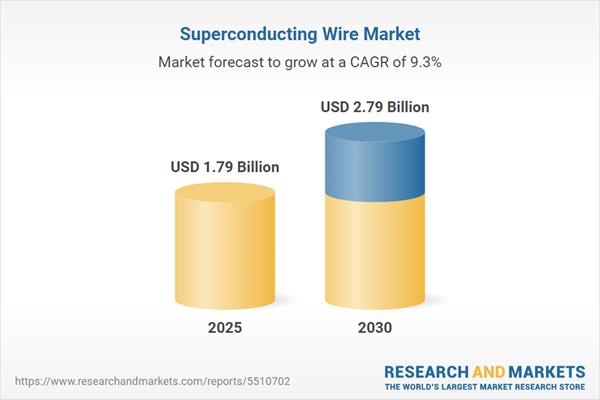Superconducting wires are electrical wires made up of superconductive material. They have zero electrical resistance at temperatures below their transition temperatures. Wires like these come with a very wide range of applications in different fields, including NMR and MRI magnets, high-field magnets for test equipment, nuclear fusion devices, and accelerators.
The increasing efficiency and improved transmission capabilities provided by the latest superconducting materials are driving market growth.
In addition, the increased healthcare spending and flourishing healthcare industry will strengthen the market growth of the superconducting wires. For instance, according to the U.S. Centers for Medicare & Medicaid Services (CMS), the National Healthcare spending grew by 4.1% and reached to US$4.5 billion in 2022.
According to the CMS's 2023-2032 National Healthcare Expenditure Projection, healthcare spending is anticipated to grow from 17.3% of the GDP in 2022 to 19.7% of the GDP in 2032. Additionally, the NHE is projected to increase by 5.6% over 2023-2032. Hence, the growing healthcare sector is anticipated to propel the market for superconducting wire in the projected period
Global superconducting wire market drivers
- There are many applications of superconducting wires, particularly in the booming automotive industry, where superconducting coils provide great magnetic flux density and deliver much more torque than ordinary motors. For instance, according to the International Organization of Motor Vehicle Manufacturers, the number of vehicles manufactured in 2022 was 61,598,650 by all major countries combined, which increased by 10%, reaching 67,133,570 in 2023. The increasing demand for passenger cars and the growing automotive sector is anticipated to positively impact the superconducting wire market in the projected period. Further, the rising demand from the electronics industry nationwide will bolster the market growth as these wires are widely used for offshore oil and gas platforms, electrical ships, electrical aircraft, or railway grids.
- The constant developments in the energy industry, such as the development of smart cities worldwide and the strict energy-efficiency standards imposed by the governing bodies, will further proliferate the market growth. For instance, according to the India Brand Equity Foundation (IBEF), the total allocated investment for Smart Cities Mission in India stood at INR 720,000 crore (US$ 86.43 billion) as of February 2024. Additionally, of the total projects, 7,742 have been tendered, work orders have been issued for 2,740 projects, and 5,002 projects have been completed as of February 2024. Hence, smart city projects are gaining popularity in many developing countries, which is anticipated to fuel the market for superconducting wires in the forecasted period.
- Continuous investment in research and development for superconducting wires to enhance their performance and to have optimal output from the wire is anticipated to be one of its major market drivers. Additionally, constant research and development for improving the quality of superconducting wires is expected to boost market growth in the projected period. For instance, in August 2024, the University at Buffalo launched the world's highest-performing superconducting wire segment fabricated at the University. In a study published in Nature Communication, the researchers reported that they have fabricated the world's highest-performing HTS (high-temperature superconducting wire) wire segment, making the price-performance metric significantly more favorable.
Global superconducting wire market geographical outlook
The North American region is anticipated to hold a significant share in the coming years.North American region will account for the highest market share due to the early adoption of superconducting wires across industries and the extensive research and development related to superconductors. The increasing investment in nuclear-fusion-based research will alsoimpact the North American superconducting wire in the projected period.
The Asia-Pacific region will also grow at a high CAGR owing to its flourishing healthcare, automotive, and electronics industries.
Reasons for buying this report:
- Insightful Analysis: Gain detailed market insights covering major as well as emerging geographical regions, focusing on customer segments, government policies and socio-economic factors, consumer preferences, industry verticals, other sub-segments.
- Competitive Landscape: Understand the strategic maneuvers employed by key players globally to understand possible market penetration with the correct strategy.
- Market Drivers & Future Trends: Explore the dynamic factors and pivotal market trends and how they will shape up future market developments.
- Actionable Recommendations: Utilize the insights to exercise strategic decision to uncover new business streams and revenues in a dynamic environment.
- Caters to a Wide Audience: Beneficial and cost-effective for startups, research institutions, consultants, SMEs, and large enterprises.
What do businesses use our reports for?
Industry and Market Insights, Opportunity Assessment, Product Demand Forecasting, Market Entry Strategy, Geographical Expansion, Capital Investment Decisions, Regulatory Framework & Implications, New Product Development, Competitive IntelligenceReport Coverage:
- Historical data & forecasts from 2022 to 2030
- Growth Opportunities, Challenges, Supply Chain Outlook, Regulatory Framework, Customer Behaviour, and Trend Analysis
- Competitive Positioning, Strategies, and Market Share Analysis
- Revenue Growth and Forecast Assessment of segments and regions including countries
- Company Profiling (Strategies, Products, Financial Information, and Key Developments among others)
The superconducting wire market is analyzed into the following segments:
By Type
- Low-temperature superconducting wires
- Medium-temperature superconducting wires
- High-temperature superconducting wires
By Application
- Electronics
- Energy
- Scientific and Medical equipment
- Automotive
- Others
By Geography:
- North America
- South America
- Europe
- Middle East and Africa
- Asia-Pacific
Table of Contents
Companies Mentioned
- American Superconductor
- Fujikura Ltd.
- Supercon, Inc.
- Furukawa Electric Co., Ltd.
- SuperOx
- THEVA Dünnschichttechnik GmbH
- Bruker
- Sumitomo Electric Industries, Ltd.
- Nexans
- Fuji Bridex
Table Information
| Report Attribute | Details |
|---|---|
| No. of Pages | 122 |
| Published | November 2024 |
| Forecast Period | 2025 - 2030 |
| Estimated Market Value ( USD | $ 1.79 Billion |
| Forecasted Market Value ( USD | $ 2.79 Billion |
| Compound Annual Growth Rate | 9.2% |
| Regions Covered | Global |
| No. of Companies Mentioned | 10 |









